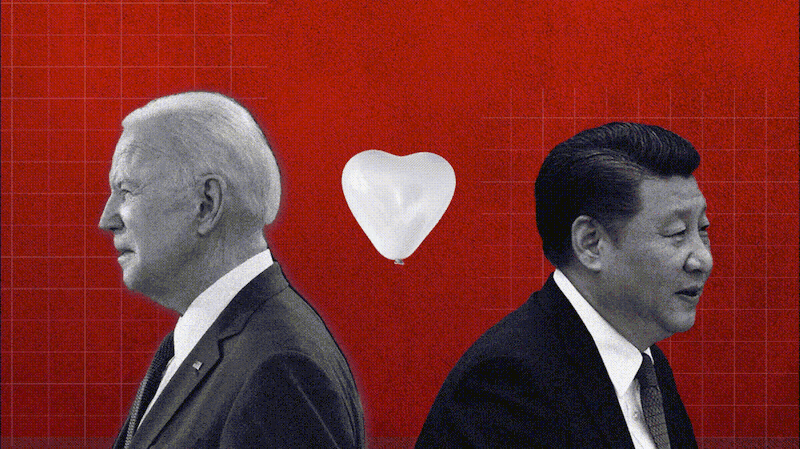By now you’ve heard and read plenty about the Chinese spy balloon that floated across the continental United States last week before it was shot down off the coast of South Carolina on Feb. 4, so I’ll spare you the details. Absurd as it was, we’re not going to remember the incident in a couple of months. Heck, you probably don’t care already.
And that’s fair enough: The fact is the hullaballoo(n) was no big deal, for several reasons.
First, the balloon posed no threat to US national security. Washington and Beijing spy on each other all the time; China didn’t need a clunky unmanned orb to collect intelligence (they have satellites and, um, your cell phone for that). Second, this wasn’t the first time something like this has happened; the Pentagon confirmed at least four Chinese balloon incursions in the recent past, including three during the Trump administration. Third, the US had every right to shoot it down and little choice to do anything but once the incident went public. And fourth, President Joe Biden was probably right to wait to give the order until he did.
The outrage from all sides — the White House, Republicans, Beijing — is nothing but hot air. Nonetheless, the incident is interesting because of what it tells us about the world we live in.
So, what lessons can we draw from balloon-gate?
Xi makes mistakes — sometimes big and costly ones. There’s been lots of speculation about why China sent a slow-moving, 200-foot-tall balloon to hover over American nuclear silos (unlike most years, when it deploys Snoopy along 5th Ave), but I see only one reasonable explanation: miscalculation.
It was obviously no accident: The aircraft was reportedly “maneuverable,” but even if it wasn’t and Beijing’s claim that it was an “errant weather balloon” was true, the Chinese would have notified the US as soon as it went wayward. And it’s hard to imagine it was intentional, since Xi Jinping had nothing to gain from provoking the US now — not while China is in the middle of a charm offensive to court foreign investment and revive economic growth after exiting zero-COVID.
Maybe he assumed he could get away with it like he had in the past, or maybe he was badly advised about the risk of retaliation. Either way, Xi didn’t want this outcome. On top of his track record of consequential missteps, this should make everyone worry about what other serious blunders Xi could make in the future.
US-China relations are a minefield. Biden and Xi have both expressed a desire to build a “floor” under the relationship, but that will prove easier said than done amid structurally intensifying strategic competition and a complete absence of trust.
Balloon-gate is only the latest in a series of mutual escalations in recent weeks, including US sanctions on a Chinese company doing business with Russia’s paramilitary Wagner Group, a likely US ban of all trade with Chinese tech giant Huawei, and new proposed Chinese export controls on key high-tech industries.
And more clashes are sure to come soon as China grows closer to Russia (possibly in defiance of US sanctions), House Speaker Kevin McCarthy travels to Taiwan, and Washington tightens the screws on China’s tech sector. The fact that a literal balloon caused the US to indefinitely postpone a much-needed meeting with Xi is a sign of how little it could take for the relationship to … blow up.
US domestic politics complicate efforts to ease tensions. It’s very hard to imagine Biden was planning to shoot the balloon down if Secretary of State Antony Blinken was heading to China to meet with Xi. And Biden was very much still planning on sending Blinken to Beijing after he found out about the balloon. Why? Because it posed no real threat to anyone, and the trip was still in America’s interest. The minute photos of the balloon went public courtesy of the Billings Gazette, though, Biden had no choice but to back off.
That’s not flip-flopping — that’s politics. America’s political polarization and bipartisan support for aggressive China policy mean any US president would’ve been under intense pressure to act tough, even if doing so undermined US strategic interests and made conflict more likely. We saw this last year with former House Speaker Nancy Pelosi’s leaked trip to Taiwan, and we’ll see it again in the spring when Speaker McCarthy travels to Taipei. This perverse political reality limits the room to stabilize ties and incentivizes actions that risk confrontation.
All of this bodes poorly for Biden and Xi’s attempted détente. Ironically, Blinken’s trip to Beijing was meant to put guardrails in place to prevent these sorts of crises from spiraling out of control. But as this episode makes clear, Washington and Beijing will struggle mightily to prevent a drift toward escalation.
___________________
🔔 Be sure to subscribe to GZERO Daily to get the world's best global politics newsletter every day on top of my weekly email. Did I mention it's free?
